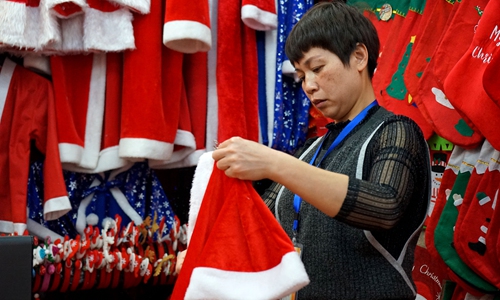Chinese festival products surge into US
By GT staff reporters Source: Global Times Published: 2020/12/2 20:20:55
E-commerce opens opportunities, but trade war impact lingers

A Christmas goods seller in a market in Yiwu, East China's Zhejiang Province, is sorting products at her shop. Local Christmas products sellers are facing a hard year ahead as the global spread of COVID-19 pandemic cuts foreign orders for their goods. Photo: Chen Xia/GT
What lies ahead for China-US trade after a prolonged trade war, which has reached a crossroads following Donald Trump's defeat in the 2020 presidential election?
Data from industry sources and e-commerce platforms regarding festive products, ranging from Chinese ornaments to fireworks, seem to paint a bright picture, but several traders said that their business with the US has not recovered from the trade war, and the pandemic is making things worse.
According to data from DHgate, a business-to-business cross-border e-commerce platform, sent to the Global Times, shipments from China to the US accounted for about 68 percent of the entire sales volume on the platform in September, normally a peak season for Christmas decoration shipping. The hottest-selling items were Santa sacks, solar LED string lights, Christmas snowmen, artificial flowers and Christmas masks.
Also, US buyers are ordering from China more frequently from websites, as the pandemic changes shopping habits.
A merchant who oversees container dispatch in the coastal city of Ningbo in East China's Zhejiang Province said shipments to the US have climbed from mid-year.
"Freight rates are at record highs and traders must book one month in advance. Trading volumes are also at comparable levels with those of 2019. The only difference is that cargo shipments under cross-border e-commerce have replaced traditional goods," the merchant told the Global Times on Wednesday.
For some industries in China, the US market is the only bright spot as the pandemic hits global demand. For example, US orders for China-made fireworks surged about 30 percent this year, while overall foreign orders fell 25 percent, Wen Guanghui, director of the export division of the Liuyang Fireworks and Firecrackers Association, told the Global Times on Wednesday.
"Orders from the US have been unprecedentedly good this year, and some companies managed to sell products that were stockpiled years ago," he said. US orders have come in for next May to prepare for celebrations for Independence Day. He said surging fireworks orders might stem from Americans' wish to cheer themselves up amid COVID-19 lockdowns.
China's exports to the US rose by 1.6 percent to $354 billion in the first 10 months this year, customs data showed.
However, trade between China and the US is still thorny and uncertain, as issues like tariffs and higher shipping costs loom large. Many Chinese enterprises, not seeing a turnaround in the situation, have shifted their focus from US to other markets, mainly Europe.
A manager of Zhengjin Pottery Decoration Co, a Yiwu-based maker of Christmas decorations, said that orders from the US used to account for 50 percent of the company's export orders, but now it's only 10 percent.
"The trade war has had a big impact on our business, and our exports to the US began to decline from 2018. Now, 80 percent of our orders come from Europe and Africa," the manager told the Global Times.
Wang Quan, general manager of Christmas tree brand Teellook, told the Global Times that US tariffs have eaten into its business. "After US import tariffs on our products were raised by about 5 percent amid the cascading trade war, orders dropped gradually as customers are very sensitive about the cost rise in our industry," he said.
A manager surnamed Li of Cangqiong Artware Co, a Yiwu-based company that mainly produces and exports artificial flowers, also said that orders to the US almost vanished this year, while overall orders were about 10 percent lower than last year.
According to Li, 50 percent of the company's products are made in their factories in Vietnam, which were closed during the outbreak of COVID-19.
Transportation was also difficult, Li said. "Costs for seaborne container shipping and customs clearance rose, as many ships coming from abroad carried empty containers," Li explained.
Many sellers shifted their focus to other countries to cope with declining US orders. Wang, for example, said that orders from Spain increased about 80 percent year-on-year in 2020, while orders from other Asian countries also surged.
Data from Alibaba-backed AliExpress, a leading business-to-consumer cross-border e-commerce platform in China, showed that sales amount from Spain, South Korea and Poland surged by seven, 15 and six times year-on-year on Friday during the platform's Black Friday promotion this year.